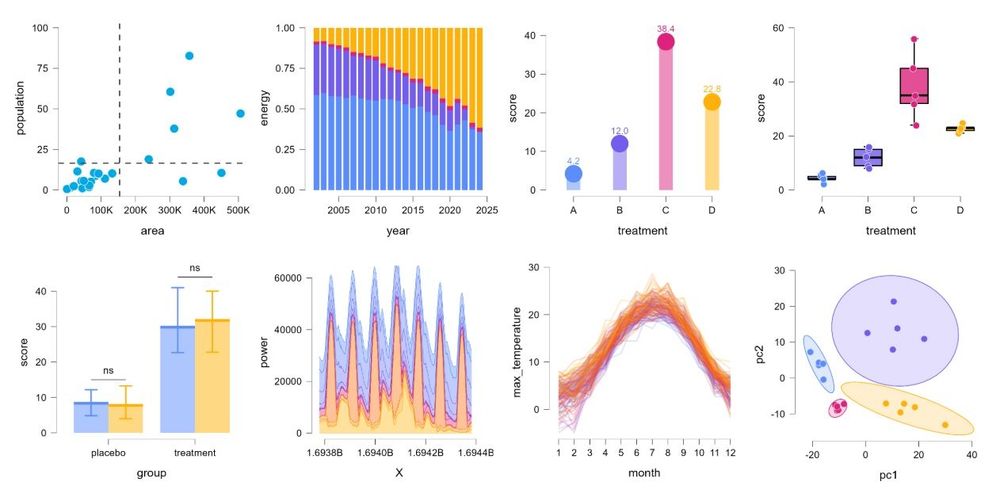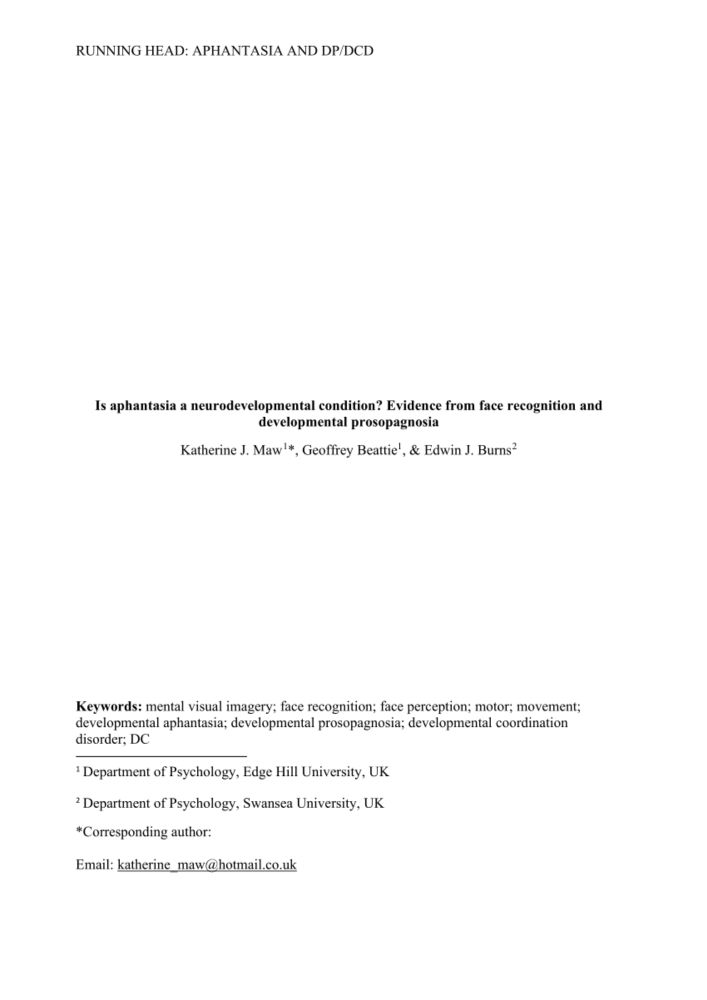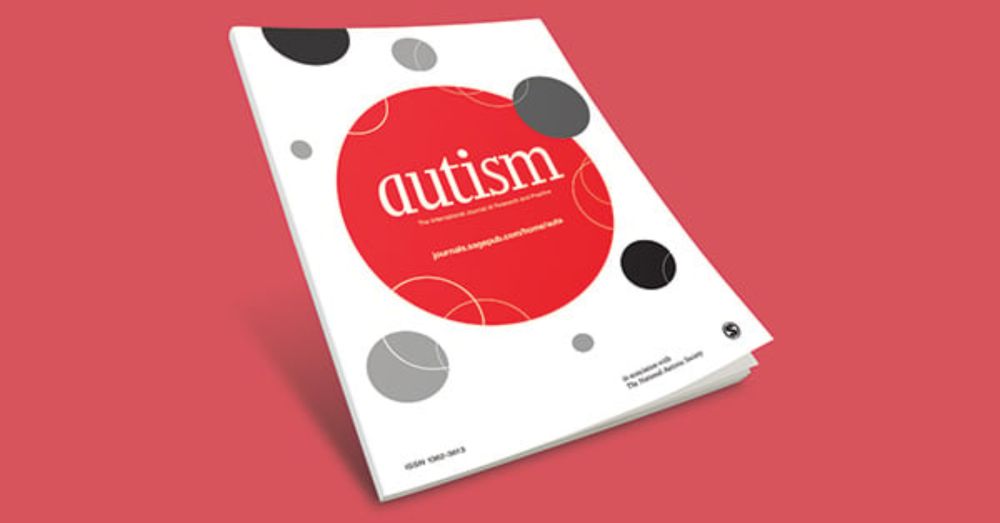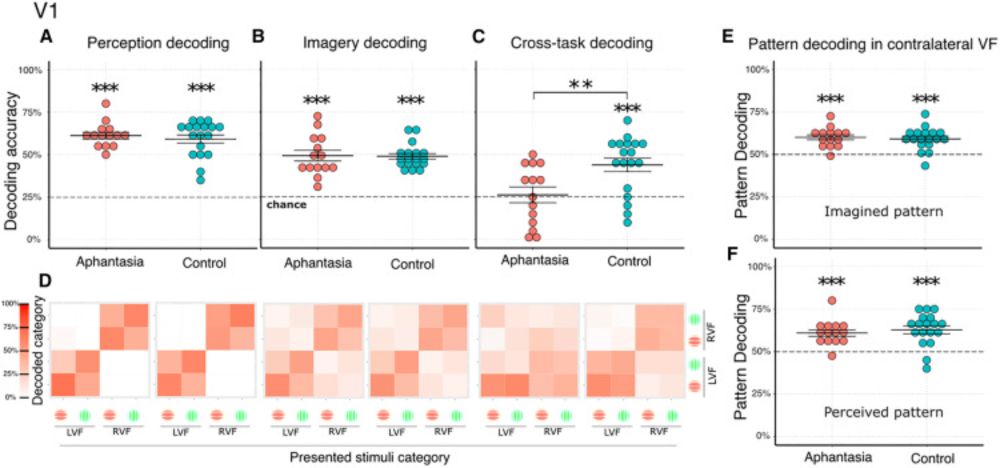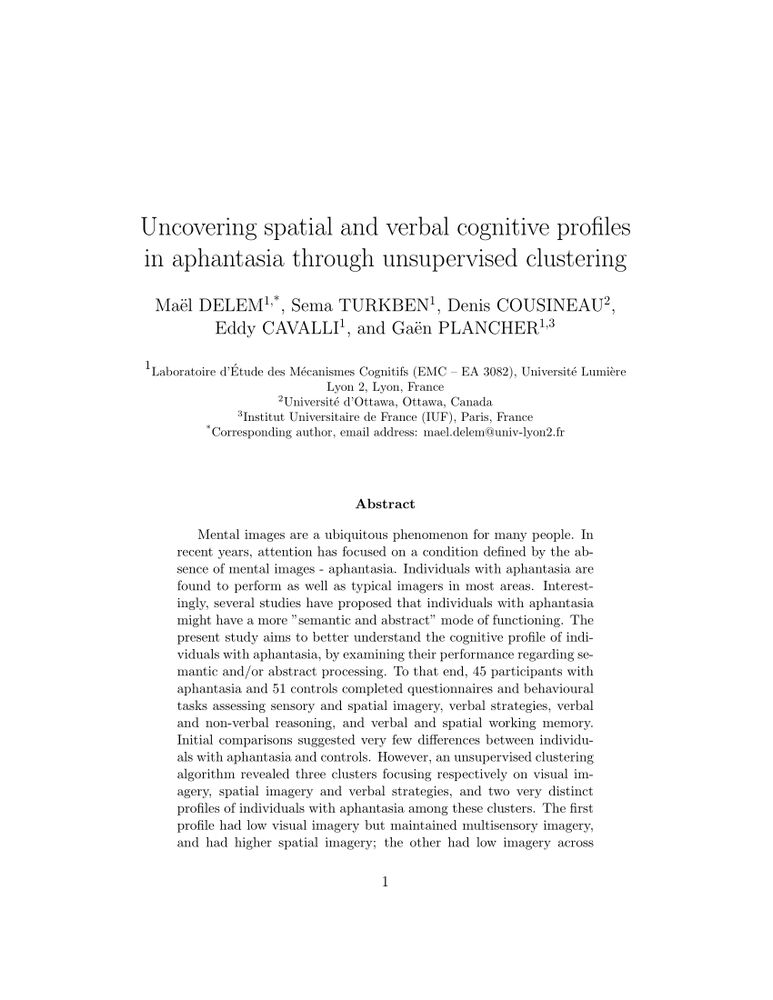The relationship between multilingualism and visual imagery: Investigating aphantasia using the VVIQ | Journal of Emerging Investigators
JEI is a scientific journal for middle and high school scientists
Paper suggests multilingualism may improve mental imagery.
emerginginvestigators.org/articles/24-...
Given multilinguals also exhibit improvements in face recognition (e.g., Burns et al., 2019), possibly by enhancing domain general attention, I wonder if that is responsible here too? #aphantasia
02.10.2025 13:44 — 👍 3 🔁 0 💬 0 📌 0

Distinct neural processing underlying visual face and object perception in dyslexia
Developmental dyslexia is a disorder marked by difficulties in reading, spelling, and connecting sounds to written language. The high-level visual dys…
Excited to share a new article from @icevislab.bsky.social! In a sample of over 60 people, we found distinct neural differences underlying object and face recognition in dyslexia. These findings highlight crucial domain-general visual processes that may contribute to word reading challenges.
23.09.2025 15:03 — 👍 14 🔁 7 💬 0 📌 2
Feel like this has just captured the attachment style of respondents.
15.09.2025 16:13 — 👍 0 🔁 0 💬 0 📌 0
Student-led General Competition – Welsh Graduate School for the Social Sciences
Are you, or someone you know, looking for a funded PhD position? I'm interested in supervising PhDs on topics related to my work, e.g., emerging neurodivergent populations, prosopagnosia, validity of psychological science, or political violence. Get in touch if interested:
e.j.burns@swansea.ac.uk
11.09.2025 07:57 — 👍 3 🔁 2 💬 1 📌 0
Not yet. I've been doing a lot of work on aphantasia, and become interested in SDAM through that. Unfortunately, we don't know much about it atm, hence why I want to work with a PhD student to learn more about it.
11.09.2025 08:32 — 👍 1 🔁 0 💬 1 📌 0
More specific topics I'm interested in supervising are aphantasia, severely deficient autobiographical memory, interoception, and alexithymia, but open to some related ideas you may have.
11.09.2025 08:02 — 👍 1 🔁 0 💬 1 📌 0
Student-led General Competition – Welsh Graduate School for the Social Sciences
Closing date for applications is the 11th of December. PhD positions are funded through the Welsh Graduate School for the Social Sciences:
wgsss.ac.uk/student-led-...
11.09.2025 07:57 — 👍 0 🔁 0 💬 1 📌 0
Student-led General Competition – Welsh Graduate School for the Social Sciences
Are you, or someone you know, looking for a funded PhD position? I'm interested in supervising PhDs on topics related to my work, e.g., emerging neurodivergent populations, prosopagnosia, validity of psychological science, or political violence. Get in touch if interested:
e.j.burns@swansea.ac.uk
11.09.2025 07:57 — 👍 3 🔁 2 💬 1 📌 0

Teilo the corgi out for brunch in Swansea.
17.08.2025 10:50 — 👍 4 🔁 0 💬 0 📌 0

The Life I Can’t Remember
I was born in the 1940s, in the last days of Empire.
A striking personal account of someone's experiences with severely deficient autobiographical memory. While memory conditions rightly garner considerable research interest, the paucity of papers on SDAM is notable, despite difficulties associated with its presence.
substack.com/inbox/post/1...
07.08.2025 13:29 — 👍 1 🔁 0 💬 1 📌 0
Regarding first person accounts, Sadie Dingfelder wrote a book about her aphantasia and prosopagnosia
01.08.2025 18:10 — 👍 1 🔁 0 💬 1 📌 0
Interesting personal account of what living with prosopagnosia is like.
31.07.2025 16:24 — 👍 2 🔁 0 💬 0 📌 0
OSF
After five years of confused staring at Greek letters, it is my absolute pleasure to finally share our (with @smfleming.bsky.social) computational model of mental imagery and reality monitoring: Perceptual Reality Monitoring as Higher-Order inference on Sensory Precision ✨
osf.io/preprints/ps...
23.07.2025 14:18 — 👍 128 🔁 35 💬 4 📌 4
Someone with aphantasia talks movingly about how difficult it is being in a Big Brother House with no mental imagery of loved ones. Mentions she does not know what family members look like, but some aphants online say they do know. So why do these differences exist? Thread 1/2 #bb27 #aphantasia
20.07.2025 15:01 — 👍 2 🔁 1 💬 1 📌 0
🧠 Just out with @pennypexman.bsky.social “Simulation in the ‘Blind’ Mind”.
We found that even without conscious imagery (aphantasia), people still simulate sensorimotor info when processing language. 💭🔤
17.07.2025 16:55 — 👍 14 🔁 7 💬 1 📌 1
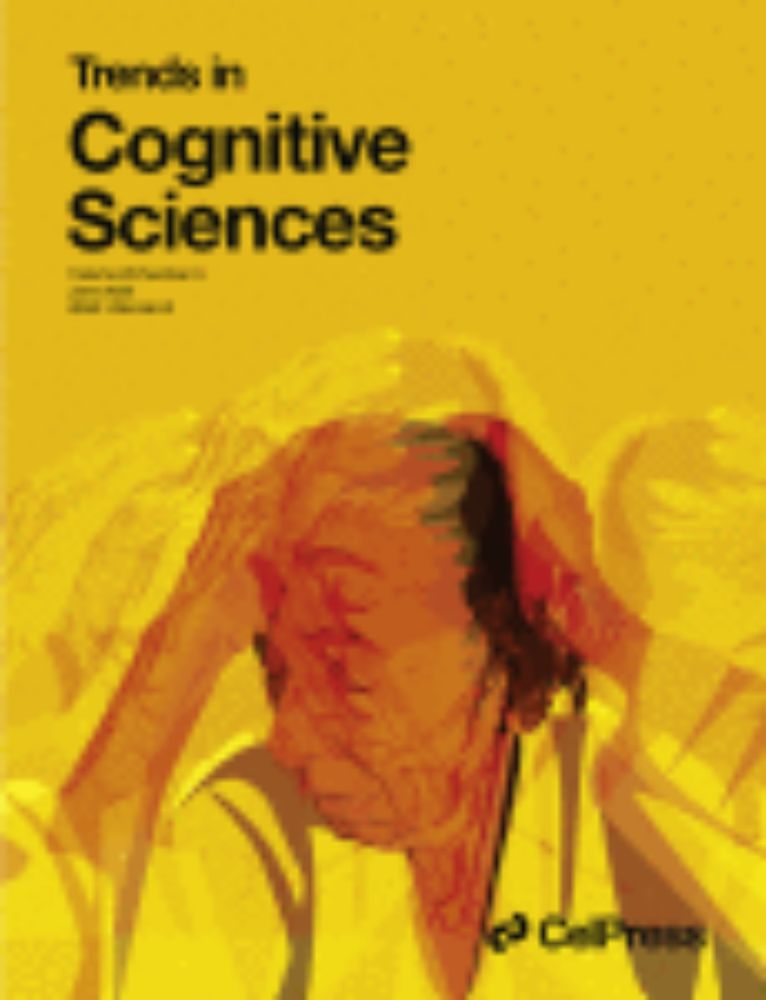
Varieties of aphantasia
My first publication in Trends in Cognitive Sciences: Varieties of aphantasia
www.sciencedirect.com/science/arti...
25.06.2025 09:15 — 👍 7 🔁 2 💬 0 📌 0
OSF
Forgot to add a link to the preprint!
doi.org/10.31234/osf...
18.06.2025 14:28 — 👍 0 🔁 0 💬 0 📌 0
Strikingly, we showed 16% of prosopagnosics were also aphantasic, in contrast to 4% in the general population.
In summary, aphantasia may be a neurodevelopmental condition in that it cooccurs with other such conditions more frequently than we would expect in the general population.
18.06.2025 08:06 — 👍 2 🔁 0 💬 1 📌 0
Given prosopagnosia occurs more frequently in aphantasia, we then asked does aphantasia cooccur in developmental prosopagnosia at an elevated rate?
We therefore tested for aphantasia in a large sample of developmental prosopagnosia cases in a third study.
18.06.2025 08:06 — 👍 0 🔁 0 💬 1 📌 0
Strikingly, the patterns between the groups were similar, suggesting that these types of difficulties may be a feature of neurodevelopmental conditions.
This, with the elevated prevalence of prosopagnosia, shows aphantasia mirrors other neurodevelopmental conditions, and so may be one itself.
18.06.2025 08:06 — 👍 1 🔁 0 💬 1 📌 0
Remarkably, these patterns of issues occur in other neurodevelopmental populations, e.g., developmental coordination disorder (DCD, lifelong troubles with movement)
In a second study, we therefore compared aphantasic patterns of face processing abilities across various tasks to a group of DCD cases
18.06.2025 08:06 — 👍 0 🔁 0 💬 1 📌 0
Strikingly, we found almost 40% of aphantasics self-reported cooccurring developmental prosopagnosia. This contrasts with the commonly reported 3% in the general population.
Also, they exhibited greater difficulties with familiar, than unfamiliar, faces.
18.06.2025 08:06 — 👍 1 🔁 0 💬 1 📌 0
One common feature shared across such conditions is that they commonly cooccur with one another at much higher rates than in the general population.
We therefore tested if aphantasia had higher rates of developmental prosopagnosia (lifelong troubles recognising faces) than the general public
18.06.2025 08:06 — 👍 0 🔁 0 💬 1 📌 0
New preprint from our lab! 🚨
Developmental aphantasia is characterised by a lifelong absence of mental imagery.
In our preprint on PsyArXiv below, we ask is aphantasia a neurodevelopmental condition, like autism, ADHD, and dyslexia? But how would you show this? Thread 👇
18.06.2025 08:06 — 👍 4 🔁 0 💬 1 📌 0
Asst Professor Psychology & Data Science @ NYU | Working on brains & climate, separately | Author of Models of the Mind: How physics, engineering, and mathematics have shaped our understanding of the brain https://shorturl.at/g23c5 | Personal account (duh)
Award-winning Science events for kids. Founded Ireland☘️Scientist & Mum, speaker United Nations 🇺🇳 Hands-on, STEM fun to kids Ireland 🇮🇪 UK 🇬🇧Canada 🇨🇦 Join us as Franchise Owners! Licences for International independent Schools junioreinsteinsscienceclub.com
Co-Creating Ireland's Public Involvement in Open Research Roadmap
ENGAGED is building a national roadmap to shape public involvement in open research in Ireland. We believe that research can and does play an important role in tackling societal challenges.
PhD student @ Durham • Facial Recognition • Anticipated Moments • Working Memory • Individual Differences • EEG • Eye-tracking
The name says it all really
He/him. Editorial Director for Robinson Psychology, views are my own.
The Canada Excellence Research Chair (CERC) in Migration & Integration program at Toronto Metropolitan University is leading research and informed debate on international migration.
www.torontomu.ca/cerc-migration/
News and information from the European Commission. Social media and data protection policy: http://europa.eu/!MnfFmT
Scholar of extremism, dystopia (fictional and otherwise)
► EXTREMISM @mitpress http://amzn.to/2BKXLgU
► OPTIMAL: A dystopian novel http://amzn.to/3aKYZ99
► https://www.jmberger.com/
Commission on AMZ links
PhD @ Swansea University Law School
Historian of the white power movement, gun violence, the apocalypse. Coloradan. kathleenbelew.com Book coming soon! Home, at the End of the World (Random House) Posts reflect my own views only.
Researching right-wing extremism in the U.S, conspiracy theories, extremist language, etc.
Professing in Albany, NY
Black Lives Matter
he/him
My Oath Keepers book: bit.ly/2DOUuh7
CV: https://tinyurl.com/meyy6xpd
Journalist/author based in the Pacific Northwest. Enemy of fascists, friend of whales. Author of ‘The Age of Insurrection: The Radical Right’s War on American Democracy’ and nine other books. Subscribe to my work at https://davidneiwert.substack.com/.
Founding Director @perilresearch.bsky.social, testing ideas to prevent violence & build social cohesion. Author, Man Up, Hate in the Homeland, The Extreme Gone Mainstream. MSNBC columnist. Can accept many opinions as long as we agree all dogs go to heaven.
Uh-oh!! Freelance journalist in @thestar.com, @wired.com, @foreignpolicy.com, @thewalrus.ca. Subscribe to my newsletter: www.bugeyedandshameless.com
Signal: JustinLing.42
Associate Professor of public health at Muhlenberg College. History, ethics, epidemiology, sports, injury prevention.
Action Head | Counter Extremism | NatCen | London
PhD PsyD CTE TAdv MRes MA(Glas) BPsS BSc(Psych)
Behavioural Psychologist | Threat Advisor
Data Clan | CxO Director
BAFFLE🎙️Podcast Editor
Dementia Community is a Charitable Community Benefit Society, a membership cooperative that provides learning and networking opportunities for the dementia care community. For more information please visit our website: journalofdementiacare.co.uk
lecturer • research on human perception and decision-making • principled statistics • computational models • he/him • https://mlisi.xyz/
Vision scientist in Experimental Psychology, University College London. Foreigner. Father. Posting perception, neuroscience, music & I guess reposted memes. He/him. Lab website: http://eccentricvision.com
We study the neurobiology of language and its relationship to consciousness, mental health, and wellbeing using neuroimaging and psychedelics at UCL 🧠 🗣️
http://www.lab-lab.org/
UCL Centre for Consciousness Research
https://www.uccr.uk/




